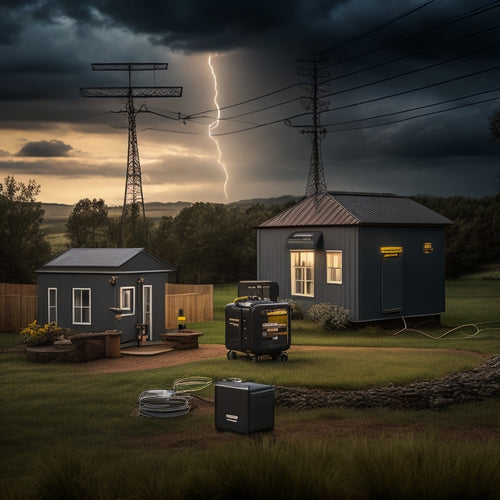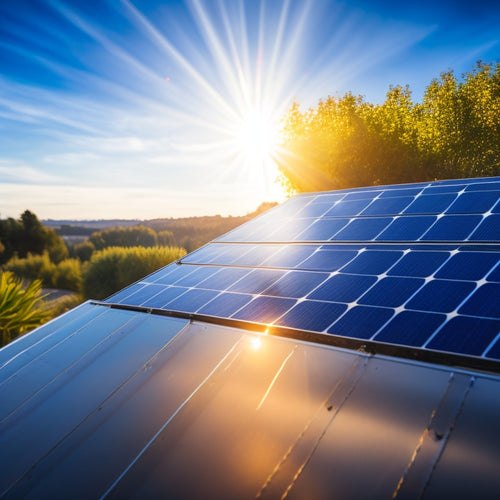
Camping Generators for a Comfortable Outdoor Stay
Share
Camping generators are vital for ensuring a comfortable outdoor experience. They provide reliable power for essential devices like smartphones, lights, and cooking appliances, enabling you to enjoy modern comforts while in nature. When selecting a generator, consider the power output and efficiency based on your device's wattage requirements. Inverter generators are quieter and cleaner, making them ideal for camping. Fuel-efficient models can run longer on a single tank, keeping your peaceful atmosphere intact. Prioritizing features like automatic shut-off and low noise levels will enhance your camping experience. Uncover more details on choosing the right generator to maximize your comfort outdoors.
At a Glance
- Choose a generator with at least 2,000 starting watts to power essential camping devices like refrigerators and smartphones effectively.
- Opt for inverter generators for quieter operation and cleaner energy, ideal for sensitive electronics during camping trips.
- Consider fuel efficiency; models that consume less fuel per hour allow for extended off-grid experiences without frequent refueling.
- Focus on noise levels; select portable generators operating at 50-60 decibels to maintain a peaceful outdoor atmosphere.
- Prioritize safety features like automatic shut-off and outdoor operation to ensure a secure camping experience while using generators.
Power for Essential Devices
When camping, you need to guarantee that your essential devices, like phones and coolers, have enough power to function effectively.
Evaluating your energy requirements is significant, as it helps in selecting a portable solar generator that meets your needs for off-grid escapades.
Understanding the power output of your generator is critical, as it determines what devices you can run simultaneously.
Make certain to assess your device requirements to choose the right generator for your needs matching power needs.
Essential Device Requirements
To power crucial devices while camping, it's important to comprehend your specific energy requirements. Start by listing the necessary devices you plan to use, such as smartphones, GPS devices, or small refrigerators. Each device has a different wattage requirement, so knowing these details helps you choose the right generator or power source.
Consider battery backups as a dependable option for smaller devices. They're portable, easy to use, and often lightweight, making them ideal for camping. These backups can be charged beforehand and used to keep your devices running without the noise of a generator.
If you're aiming for a more sustainable choice, investigate solar options. Portable solar panels can capture sunlight to charge your devices throughout the day. They're perfect for longer camping trips where traditional fuel sources may not be available.
Ultimately, determine how often you'll need to recharge these devices and match that with the generator's capacity. By understanding your power needs, you can enjoy the freedom of the outdoors without worrying about staying connected or powered up.
Generator Power Output
Understanding generator power output is crucial for guaranteeing your essential devices stay functional while camping. When choosing a generator, you need to take into account the wattage required for each device. For instance, a small fridge might need around 100-200 watts, while a laptop could require 50-100 watts.
Always sum up the total wattage to determine the generator's capacity you need.
Portability features are also significant. Look for lightweight models with handles or wheels, making it easier to transport your generator to your campsite. A compact generator can be a transformative factor, allowing you to set up wherever you want without hassle.
Safety considerations shouldn't be overlooked. Confirm your generator has features like automatic shut-off and overload protection to prevent potential hazards.
Always operate your generator outdoors to avoid carbon monoxide buildup, and keep it away from tents and sleeping areas.
Convenience for Outdoor Activities
When you're out camping, having a reliable power supply is vital for keeping your essential devices running.
A portable solar power generator can provide a sustainable and eco-friendly energy source, allowing you to adopt off-grid power solutions for your camping trips.
A camping generator enhances your outdoor comfort by providing electricity for lighting, cooking, and charging your gear.
With this added convenience, you can focus more on enjoying nature and less on managing power shortages.
Essential Power Supply
Camping generators bring a reliable power supply to your outdoor excursions, ensuring you stay connected and comfortable. They're essential for powering devices like smartphones, laptops, and lights, giving you the freedom to enjoy nature without sacrificing modern conveniences.
With various models available, you can choose one that fits your specific needs, whether you're looking for a lightweight option for a weekend trip or a more sturdy generator for longer stays.
While camping generators are a solid choice, don't forget about solar alternatives and battery backups.
Solar generators, for instance, utilize the sun's energy, providing a silent and eco-friendly power source. They're perfect for those who prefer a greener option while still enjoying the comforts of home.
Battery backups can also serve as a compact solution, keeping your devices charged without the noise and fuel of traditional generators.
Enhancing Outdoor Comfort
Having a reliable power source can greatly improve your outdoor experience, making activities more enjoyable and convenient. With a camping generator, you can power essential devices like lights, cooking appliances, and charging stations, allowing you to create a cozy atmosphere that complements your surroundings.
Imagine winding down after a day of exploration, surrounded by the soft glow of LED lights, while your favorite playlist plays in the background. This is where comfort enhancements come into play. A generator provides the flexibility to carry out activities regardless of daylight, extending your time in nature without sacrificing comfort.
You can use your generator to keep your devices charged, ensuring you stay connected with friends and family or find your way around effectively. Additionally, the ability to brew a fresh cup of coffee or heat up a meal adds a layer of comfort that boosts your camping experience.
Key Specifications Overview
When considering a camping generator, it's crucial to understand its power output capacity and fuel efficiency rating.
These specifications directly impact how well the generator meets your power needs while minimizing fuel consumption.
Additionally, exploring options like portable solar panels can enhance your camping experience by providing a clean energy alternative.
Power Output Capacity
Power output capacity is a critical specification to evaluate when selecting a camping generator, as it directly impacts your ability to run essential appliances and devices. You need to verify the generator can handle your power requirements, especially if you plan to use solar power or inverter generators, which can offer quieter, more efficient energy solutions.
Here's a quick reference table comparing various generator types and their power output capacities:
| Generator Type | Power Output (Watts) |
|---|---|
| Portable Gas | 2,000 - 5,000 |
| Inverter Generator | 1,000 - 4,000 |
| Solar Generator | 300 - 1,500 |
| Dual Fuel Generator | 3,000 - 8,000 |
When evaluating your needs, think about what devices you want to power—lights, refrigerators, or even small appliances. The right generator will give you the freedom to enjoy outdoor activities without sacrificing comfort. Always remember to contemplate surge wattage, which can be considerably higher than running wattage. Making informed decisions will guarantee your camping experience remains enjoyable and hassle-free.
Fuel Efficiency Rating
Fuel efficiency is an essential factor to evaluate in your camping generator selection, as it determines how long you can run your devices on a single tank of fuel. Different fuel types, such as gasoline, propane, and diesel, all have varying efficiencies.
Gasoline generators are often the most common, but they can consume fuel quickly, especially in larger generator sizes. Propane generators tend to be more fuel-efficient and produce fewer emissions, making them an eco-friendlier option.
When choosing your generator, consider its fuel consumption rate, usually measured in gallons per hour at a specific load. This rating helps you estimate how long you'll be able to power your gear during your excursions.
For instance, a generator with a fuel efficiency rating of 0.5 gallons per hour can last considerably longer than one that consumes 2 gallons per hour, especially if you're going to be off the grid for an extended period.
Selecting a generator that balances size, power output, and fuel efficiency will give you the freedom to enjoy your outdoor experiences without constantly worrying about refueling.
Selecting Based on Power Output
When selecting a camping generator, it's vital to determine your power needs first.
Consider the wattage ratings of different models to guarantee they can handle your equipment without overloading. Understanding the essential components, such as key components of off-grid solar systems, can also help you make informed decisions about energy needs.
Determine Your Power Needs
To choose the right camping generator, you first need to assess your power needs based on the devices and appliances you'll be using.
Start by listing everything you plan to power, such as lights, a refrigerator, or charging devices. Each device has a specific power consumption, often measured in watts. Make sure to check the manufacturer's specifications to get accurate figures.
Next, calculate the total wattage you'll need. It's essential to take into account starting watts—some appliances draw more power initially than they do while running. For instance, a refrigerator might require additional power when its compressor kicks in.
Energy efficiency is also important. Look for generators that provide more output with less fuel consumption, allowing you to stay off the grid longer without compromising comfort.
This efficiency not only saves you money on fuel but also reduces overall noise, which enhances your outdoor experience.
Compare Generator Wattage Ratings
Understanding the wattage ratings of different camping generators can help you make an informed choice that matches your power needs. Generator types vary greatly in output, typically measured in starting (surge) and running watts.
Starting watts indicate the initial power required to kick-start devices, while running watts maintain continuous operation. For instance, if you plan to run a refrigerator, a generator with at least 2,000 starting watts is advisable, while a model providing around 1,500 running watts will suffice once it's up and running.
Inverter generators offer unique benefits, such as quieter operation and cleaner power, making them ideal for sensitive electronics. They often provide a lower wattage output but are more efficient, allowing you to stretch your fuel supply further.
Consider your specific power needs against each generator's wattage ratings. Select a generator that not only meets your immediate requirements but also allows for future flexibility.
Whether you're powering up lights, a cooler, or charging devices, understanding these ratings will guarantee you've got the right generator for a comfortable, worry-free outdoor stay.
Quieter Operation Than Competitors
When choosing a camping generator, noise level is an essential factor to take into account.
You'll find that many models on the market produce varying decibel levels, which can affect your camping experience.
Noise Level Comparison
Noise levels in camping generators can make a significant difference in your outdoor experience, especially during those peaceful nights under the stars. When you're out enjoying nature, the last thing you want is a loud generator disrupting your tranquility.
Understanding generator types and their noise levels is essential for achieving that serene environment. Portable inverter generators are often the quietest option on the market, thanks to advanced sound dampening technology. They typically operate at 50-60 decibels, which is similar to a normal conversation.
In contrast, traditional generators can produce noise levels exceeding 70 decibels, which can be quite disruptive in a camping setting. When selecting a generator, consider its noise rating carefully. Many manufacturers now highlight noise levels in their specifications, making it easier for you to find a quieter model.
Some brands even offer additional sound-dampening features, like insulated enclosures and improved mufflers, to further minimize noise.
Frequently Asked Questions
Can I Use a Camping Generator for My RV?
Yes, you can use a camping generator for your RV, but make certain its generator compatibility matches your RV's power requirements. Check wattage needs to avoid issues, and you'll enjoy freedom on the open road.
What Fuel Types Are Available for Camping Generators?
When choosing a camping generator, you've got options like propane, which offers efficiency and convenience, and solar generators, providing eco-friendly power. Each fuel type caters to different needs, ensuring you stay energized during your excursions.
Are Camping Generators Safe for Indoor Use?
Imagine running a generator inside your garage during a storm. It's risky! Generator safety says never use them indoors due to indoor hazards like carbon monoxide. Always prioritize ventilation and safety when using any generator.
How Do I Maintain My Camping Generator?
To maintain your generator, follow generator troubleshooting tips like regular oil changes and fuel stabilization. Implement proper generator storage practices, ensuring it's clean, dry, and securely stored to maximize performance and enhance your outdoor excursions.
What Is the Average Lifespan of a Camping Generator?
A high-quality generator, like a Honda EU2200i, typically lasts 10-20 years with proper maintenance. Brands vary, but you can expect around 1,000-3,000 hours of power output before significant performance declines. Keep it serviced for longevity.
Explore More
In the world of camping, "A stitch in time saves nine" perfectly captures the importance of being prepared. By choosing the right camping generator, you're ensuring a comfortable outdoor stay with power for essential devices and the convenience for activities you love. With a focus on quieter operation and key specifications, you can select a generator that meets your needs without compromising tranquility. So gear up and enjoy your outdoor escapades with the peace of mind that power brings!
Related Posts
-

How to Achieve a Zero-Waste Lifestyle for a Greener Tomorrow
To achieve a zero-waste lifestyle, start by adopting the principles of refusing, reducing, reusing, and recycling. Sw...
-

Key Components of a Reliable Emergency Power Supply System
A reliable emergency power supply system requires several key components. You need proven performance metrics to guar...
-

How Efficient Are Thin Film Solar Cells
Thin film solar cells provide an innovative approach to energy generation, boasting efficiency rates generally betwee...


